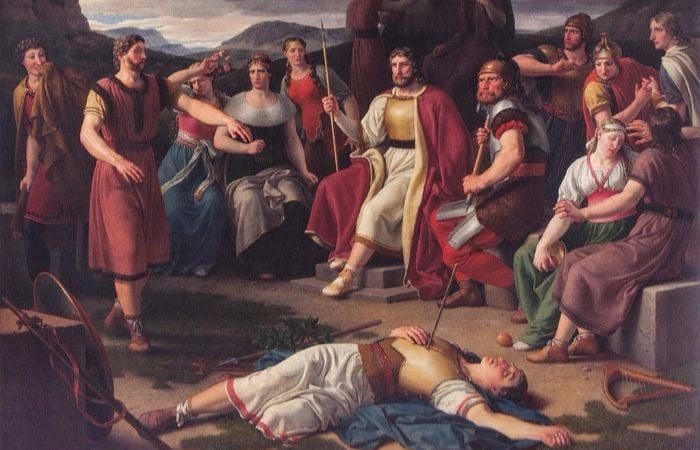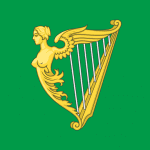I’ve been thinking about prayer and the practice of paganizing christian prayers among druids and witches in ADF and the wider Reconstructionist community.
I recently came across a comment on social media that denigrated my work because I ‘included christian traditions’ in an article about paganism. This is about my article about Irish Samhain customs. If I look past their assumption that I was reporting on pagan traditions, which the article does not assert, I start to wonder the extent people go through to throw out the baby with the bathwater.
If we use the methodology described in many reconstructionist traditions, especially that described by the CR FAQ, specifically the part where we imagine the old religion and then project it forward to modern times, and not recreate the Iron Age; we come up with a bit of evidence that helps us determine if prayer is part of Indo-European religion or not.
We know that all the Indo-European languages are related. Let’s say that if proto-slavo-germanic was the parent to the germanic language family, then proto-indo-european is its grandmother. While the reality is certainly more nuanced than that, this is a good way to understand why ADF has an Indo-European focus.

So this means Sanskrit, a Daughter of Proto-Indo-European in our mock visualization, is basically like the aunt to germanic languages.
The same is the case with the religions and cultures of the people that spoke those languages.
3 Indo-European Prayers
So if we look at Sanskrit holy writings from their oral and poetic traditions, and if we see prayers there, they would be measurably 5000 years old and and therefore 3000 years older than christianity.
We know we see prayers in heathen sources written by christians. For example:
Hail to thee Day, hail, ye Day’s sons;
hail Night and daughter of Night,
with blithe eyes look on both of us,
and grant to those sitting here victory!
Hail Aesir, hail Asynjur!
Hail Earth that givest to all!
Goodly spells and speech bespeak we from you,
and healing hands in this life!
(Sigdrifumál:2-3)
But the real question is, do we have Indo-European prayers from 3 sources, at least 2 european and 1 asiatic in total? This is the anthropological test we need to hold ourselves to in order to determine if something is a candidate for further investigation as being a practice of proto-indo-european speaking peoples.
So let’s go. Rg Veda
1 WHAT shall we sing to Rudra, strong, most bounteous, excellently wise,
That shall be dearest to his heart?
2 That Aditi may grant the grace of Rudra to our folk, our kine,
Our cattle and our progeny;
3 That Mitra and that Varuna, that Rudra may remember us,
Yea, all the Gods with one accord.
4 To Rudra Lord of sacrifice, of hymns and balmy medicines,
We pray for joy and health and strength.
5 He shines in splendour like the Sun, refulgent as bright gold is he,
The good, the best among the Gods.
6 May he grant health into our steeds, wellbeing to our rams and ewes,
To men, to women, and to kine.
7 O Soma, set thou upon us the glory of a hundred men,
The great renown of mighty chiefs.
8 Let not malignities, nor those who trouble Soma, hinder us.
Indu, give us a share of strength.
9 Soma! head, central point, love these; Soma! know these as serving thee,
Children of thee Immortal, at the highest place of holy law.
(HYMN XLIII. Rudra)
And among the Ancient Greeks or Hellenes:
Pythagoras “… forbids men to pray for anything in particular for themselves, because they do not know what is good for them.”
We have our three after only a short google search. We could make mountains of these. But we can safely see past any christian baggage we have, or draconian reconstructionism, set down our aversion to submitting to a higher power in pleading manners, or other acts of prostration, and try to understand ways we can use prayer as a solution to psychological phenomena. Odin prostrated himself for gothi’s sake.
An infant gets hungry or sick, the infant cries, you come to its aid, this is the root of prayer. Any sentient mammal will evolve into consciousness with prayer as a natural part of their being for this reason. So we pray because it is a natural psychological management tool for exiting uncomfortable emotional states. Not only that, if you have good relations with the gods and dead, you’re pleading will be heard and temporary aid dispatched and rendered to you… if you believe in that sort of thing as I do. Just don’t expect it. Be prepared to overcome without it.
Just this past week in a fb group to which I belong, there was an argument among the admins that has turned into a schism and then into an all out mud slinger of a facebook fight. All over the paganization of christian prayers. The schism was mirrored in the people as well as is always the case, the praying heathens took issue with the admins who were placing the root of germanic prayer practices in christianity.
The inclination to label portions of what we do as christian can be ridiculed upon the discovery of pre-christian examples of such practices existing. After only a 5 minute google search.
So… where’s the inclination coming from? Wherever, there you have a bias and there you have baggage to unpack that has nothing to do with finding truth. And as Druids, we seek truth, even if it is destructive to our current worldview. The exact old religion could walk right by the baggage encumbered and weary, and they wouldn’t notice it.
And, bottom line, we owe gratitude to christians for even preserving whom the Irish gods are. There isn’t a lick of Irish paganism that wasn’t preserved by a follower of christ. The same thing can be said for other paganisms in europe.
Changing Prayers: To What Degree?
Can you just take a prayer and replace the names and epithets of god with the names and epithets of your own god? In some cases yes, in some cases no.
There are rules, some we know, some to be discovered, about how these sorts of things work.
If a prayer speaks of the world, its poetry should reflect Indo-European worldviews instead of christian ones. Likewise if it speaks of trinities, it needs to take a trifunctional approach like it does in Indo-European poetries.
If it speaks of weapons, it needs to be paganized with the weapons of the gods. Additionally how the weapons are being used and if in a just manner not inimical to the virtues we hold and beliefs we have.
These are the things that need attention and detail when writing and rewriting prayers, poems, charms, or neo myths with which to cover holes that we may have(e.g Creation myths: The Invasion of Banba).
Here are two prayers from the CG I edited. They have a focus on Brighid.
The Genealogy of Bríd
The genealogy of the holy maiden Bride,
Radiant flame of gold, noble mother of gods,
Bride the daughter of Dagda Aed,
Son of Elatha, son of Net, son of Induí,
Son of Allduí, son of Bochna and Bith,
Every day and every night,
That I say the heritage of Bride,
I shall not be killed, I shall not be harried,
I shall not be put in cell, I shall not be, wounded,
Shall Follower of Christ leave me in forgetfulness.
No fire, no sun, no moon shall burn me,
No lake, no water, nor sea shall drown mc,
No arrow of fairy nor dart of fay shall wound me,
And I under the protection of my Holy Bríd,
And my gentle god is my beloved Bríd.Repaganized Carmina Gadelica Vol I rosc 70
Bríd the Aid-Woman
There came to my assistance,
Bóann fair and Bríd;
As Bofind bore Aengus,
Without flaw in him,
Aid me now in my unbearing,
Aid me, O Bríd!
As Aengus was conceived in Day,
Full perfect on every hand,
Assist you me, foster-mother,
The conception to bring from the bone;
And as you did aid the White Cow,
Without gold, without corn, without kine,
Aid me, great is my sickness,
Aid me, O Bríd!Repaganized Carmina Gadelica Vol I rosc 71














